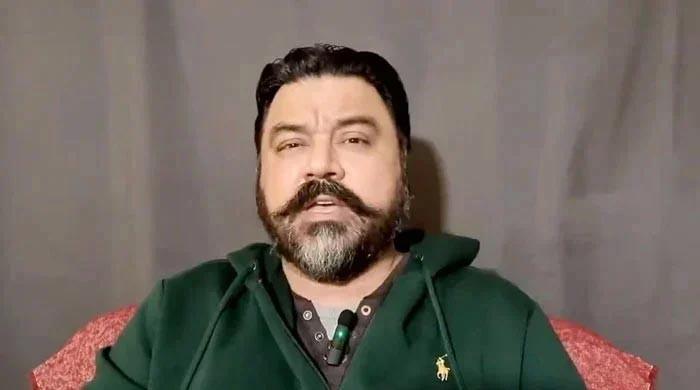
Brigadier (retd) Rashid Naseer has secured a landslide win in his high-profile defamation case against Major (retd) Adil Raja at the London High Court, according to the judgement.
The UK High Court Judge Richard Spearman KC has ruled that Raja defamed Naseer, without any factual basis and evidence, made false allegations and therefore the court has awarded £50,000 in damages to Naseer, an injunction restraining Raja from repeating his baseless and false allegations ever again.
The court also ordered Raja to publish a summary of the judgement confirming that Naseer has won the case and that the allegations were defamatory. Raja will have to pay the legal costs of Naseer, which have been approved by the court at around £300,000.
Brig (retd) Naseer had travelled from Pakistan in July this year to attend the week-long trial in the third week of July 2025. He is in London today as the judgement was announced.
The retired senior intelligence officer commented: “Today, I stand vindicated. After a gruelling 3-year high court battle, justice has finally prevailed. Let this serve as a reminder to those who openly lie, spread hate and defame people to create sensationalist drama, that no court in any land will side with you, be it in Pakistan or abroad. I am grateful to London High Court Judge Richard Spearman KC for his verdict. I also wish to thank my Barrister David Lemer, and solicitors, Ushrat Sultana and Sadia Qureshi of Stone White Solicitors, for their hard work and dedication to this case. This victory is not just mine, but a victory for every person who has been maliciously targeted by such characters.”
Naseer started his defamation claim against Raja in August 2022 over ten publications — published between June 14 and 29, 2022, on Raja’s Twitter, YouTube and Facebook. The court found that nine of these publications were seriously defamatory to Naseer and caused him serious harm.
These statements were: Punjab elections were not proceeding because Rashid Naseer had taken complete control of the Lahore High Court (14 June 2022); Rashid Naseer had several meetings with Asif Ali Zardari to discuss election manipulation (19 June 2022); Rashid Naseer is a black sheep in the ISI and Pakistan Army who will be eliminated at the right time (19 June 2022): Rashid Naseer had set up an election cell in the Sector Headquarters Lahore to rig elections for PDM parties, was bribing politicians into casting votes against PTI candidates, abusing his position and using huge unaccounted funds against the PTI including and using the Police and Dolphin Force to harass PTI supporters (19 June 2022); Rashid Naseer had caused the police to do his bidding by making a baseless allegation of bribery against Adil Raja (29 June 2022); Rashid Naseer is horse-trading for General Bajwa (29 June 2022); Rashid Naseer registered a complaint against Adil Raja in order to defame him and prevent him from receiving his identity papers(29 June 2022); Rashid Naseer got Adil Raja’s brother-in-law arrested (29 June 2022); and Rashid Naseer played a prominent role in regime change and his corrupt practices have made him a billionaire (29 June 2022).
The trial focused on the allegations made by Raja against Naseer; the state of media and politics in Pakistan, Arshad Sharif’s killing, the removal of Imran Khan’s government, ethical and responsible journalism, Pakistan’s establishment and how Naseer became the focus of Raja’s social media campaign.
During the trial in July this year, Raja had pleaded defences of truth and public interest. To succeed on the truth defence, Raja had to show that the allegations he made were true or substantially true.
Raja had pleaded that all the material he had published about Naseer was true, but he did not produce any evidence before the UK High Court judge that the allegations were true.
The evidence presented by Raja’s three witnesses — Shahzad Akbar, Shaheen Sehbai and Syed Akbar Hussain — also did not support a defence of truth. None of Raja’s witnesses claimed to have any direct knowledge of the misconduct alleged against Naseer, and in fact, Shaheen Sehbai stressed that he did not know whether Naseer bore any personal responsibility.
On the second day of the trial, Raja abandoned his truth defence as the judge warned him that he had not put any evidence or facts before the court to show the allegations he made about Naseer were true.
Raja then started his defence on public interest, which the judge also criticised. For the public interest defence, Raja had to show that the false allegations he made were on a matter of public interest and that he reasonably believed that publishing the allegations was in the public interest.
Judge Richard Spearman KC noted that Raja produced no contemporary documents whatsoever evidencing either what he was told by his sources, or the steps he took to obtain verification. He provided no explanation for this in his written evidence.
At one stage during the course of the trial, Raja referred to written records in what he described as diaries but he later clarified that they contained nothing material to the issues in the case.
The judge stated that he was not persuaded that the allegations that Raja published came from his “sources” because (i) when observing Raja give oral evidence, he was unable to determine whether Raja’s evidence was reliable or a case of mistaken recollection or exaggeration; and (ii) Raja produced no contemporary record of any kind which supported his evidence.
Raja was unable to satisfy the judge that his source(s) provided him with information to support the allegations that he made against Naseer; therefore, his public interest defence failed.
Naseer’s Barrister argued that Raja was treating information that had a general meaning as providing a basis for specific allegations concerning Naseer, even though the source material Raja relied on contained no such allegations.
High Court Judge Richard Spearman KC gave three examples of this in the written judgement: (1) Adil Raja had claimed that the Fact-Finding Report produced on December 2, 2022, into the killing of Arshad Sharif had made it official that the ISI was involved in Arshad Sharif’s murder. The judge found that this was not the case. There was no mention of the ISI in the Key Findings of the report and the report did not make it official that the ISI was involved in the killing of Arshad Sharif; (2) Adil Raja claimed that the former head of the ISI, General Asad Durrani had confirmed in a tweet that Naseer used his official role to implement the illegal and extrajudicial agenda of the military junta. The Judge found that this tweet did not even refer to Naseer, let alone to him misusing his position for the purposes alleged; and (3) Adil Raja relied on a tweet posted by Amnesty International on 15 June 2023 and claimed the tweet expressed concerns over the disappearance of journalists. The Judge found that the tweet did not even mention this.
In respect to the defamatory statements published by Raja, the judge had made a number of points. The judge said that Raja had claimed that Naseer was interfering in elections by taking “complete control of the Lahore High Court”.
Raja’s star witness, Shahzad Akbar, contradicted what Raja said and explained that the Lahore High Court was not under anyone’s improper control and it was instead intent on ensuring that the elections proceeded, although its orders were not implemented.
The judge found that there were no reasonable grounds to believe that it was in the public interest to publish the statement that Naseer had meetings with Asif Ali Zardari concerning election manipulation, which Naseer strongly denied.
Raja relied on material that postdated his defamatory statements and the judge found that none of this material could have been relied upon by Raja at the time of publication.
The judge wrote that no evidence was put before him by Raja that he made any efforts to obtain verification of Asif Ali Zardari’s alleged meeting with Naseer, for example, detailing how many calls were made and when.
“The fact that he has nothing to produce is remarkable” and “there is a question whether [Adil Raja’s] claimed source(s) may have had an axe to grind against [Rashid Naseer]” and that “there is no evidence, and certainly no contemporary record, that [Adil Raja] considered or investigated this issue at the time.”
The judge noted that Raja’s three witnesses were articulate and impressive, but he stressed that their evidence had zero material value or weight to the case and their arguments did not help to convince the court that Naseer was involved in the wrongdoings as alleged by Raja.
In fact, the judge found that while Shaheen Sehbai was critical of Naseer and made allegations against the working of the ISI and some of the reporting in the international press about the agency, the judge said that Shaheen Sehbai failed to back up his assertions with any relevant evidence and even if he did so, that would not be relevant to the claim by Naseer.
The judge wrote: “These views thus have no evidential weight” and “Mr Sehbai’s evidence does not materially assist [Adil Raja]”. The judge found that Shaheen Sehbai did not allege “corrupt practices” against Naseer in his witness statement.
Syed Akbar Hussain told the court that he did not personally know Naseer and had no knowledge of the allegations made by Raja in the publications.
The London High Court heard that Shahzad Akbar met Naseer in June 2022 and asked him to help bring pressure on the courts to get Shehbaz Sharif convicted on a speedy basis, but Naseer refused to interfere.
Shahzad Akbar said he met Naseer to seek an end to the judicial interference by the establishment but Naseer’s lawyer told the court it was a lie, and the focus of the meeting remained Shahzad Akbar’s obsession on how to manipulate the judiciary to get Shehbaz Sharif convicted in some case, by hook or by crook.
The judge found that Shahzad Akbar put forward his own opinions but could not verify the exact manner in which the events occurred or the specific sources of Raja’s information. The judge was critical of Shahzad Akbar’s approach as he made the same error, which the judge said infected Raja’s case throughout. Shahzad Akbar believed that what mattered was Raja’s political analysis, not whether Raja had any proper basis for making the allegations he made. This, the judge said, was the wrong approach in these proceedings.
The judge said that the claim attracted a lot of public interest because of Raja’s suggestion that the claim was, in reality, brought or funded by the ISI. Raja had been alleging that the claim brought by Naseer was a SLAPP (Strategic Litigation Against Public Participation) case, but Raja’s Barrister made no reference to SLAPP in his closing submissions and the judge noted he did not believe it was an ISI-funded case.
The judge found that all the words complained of had a seriously defamatory meaning and their inherent tendency to cause harm to reputation was equally great. He also found that the extent of the publications, in each instance, was massive in the form of likes, shares, and the grapevine effect that they caused serious harm to Naseer’s reputation, with further defamatory impact, and that no effort was made by Raja to seek Naseer’s version.
Naseer was represented by Barrister David Lemer of Doughty Street Chambers and Ushrat Sultana and Sadia Qureshi of Stone White Solicitors. Raja was represented by Barrister Simon Harding.
Discover more from Brackly News
Subscribe to get the latest posts sent to your email.



